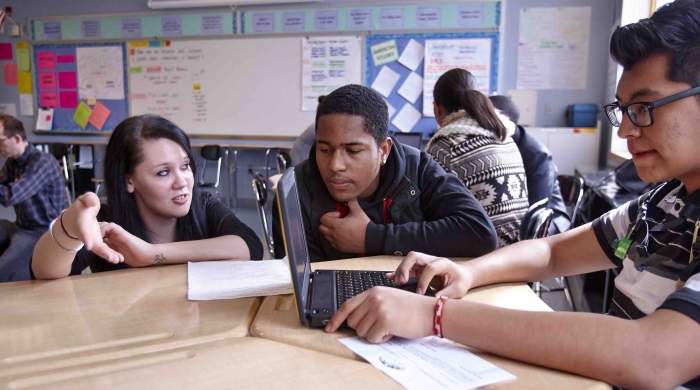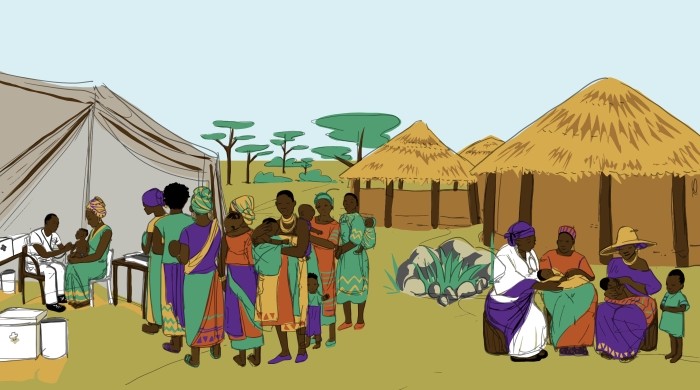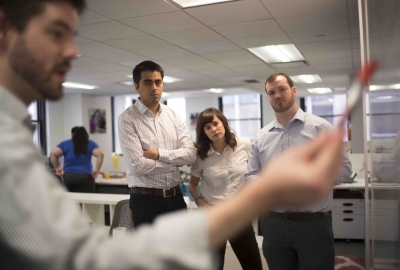
Research
Our faculty study a wide range of ecologies (e.g., families, schools, neighborhoods, policy contexts, programs) and preventive interventions (e.g., pertaining to school readiness; school success; HIV and health behaviors; mental health; housing and homelessness), locally, nationally and internationally. Our faculty also conducts work on how cultural factors and identities influence and interact with experiences of these ecologies and interventions. Our New York City location provides students and faculty with an ideal urban setting for studying many kinds of communities and settings combined with easy access to gateways to the world at large.
Student Research
Students work collaboratively with faculty on a range of activities in these research areas, including study design, data collection, primary and secondary data analysis, journal publications, conference presentations, policy briefs, and evaluation activities carried out with service, community, and policy organizations.
Students are required to participate on the research team of a PSI faculty member (or another Applied Psychology faculty, by program approval), beginning the first semester of their first year. Students are expected to allocate at least half of their time (20 hours per week) to this activity. By year 3, in line with our training expectations to be exposed to more than one project, students should spend a minimum of 5 hours (of the 20 hours per week) working with another research mentor (within or outside of the program by approval of primary research mentor). Students are free to transition onto new research teams throughout their doctoral training.
Affiliated Research Labs/Projects

ARCADIA for Suicide Prevention
PSI Faculty: Pamela Morris-Perez, Ph.D.
View Dr. Morris-Perez's Publications
ARCADIA for Suicide Prevention takes a developmentally-informed, population-health approach to adolescent suicide. We focus on the places where adolescents already are (schools, primary care, emergency rooms), leverage trusted sources of support (peers, parents, trusted adults), are attuned to the developmental needs of adolescent autonomy and identity, and are guided by the ideas of youth themselves. Our focus is to strengthen bridges, integrating prevention and intervention, within and across the places where youth are situated. We approach our work as a partnership between academia and public agencies, for seamless integration into practice at scale.

Baby's First Years: A Randomized Controlled Trial of Poverty Reduction
PSI Faculty: Hirokazu Yoshikawa, Ph.D.
View Dr. Yoshikawa's Publications
Baby’s First Years is the first study in the United States to assess the causal impact of poverty reduction on family life and children’s cognitive, emotional, and brain development. It is a randomized control trial that provides monthly, unconditional cash gifts (either $333/month or $20/month) to low-income mothers and their children in the first years of a child’s life.
Core PIs: Drs. Kimberly Noble, Katherine Magnuson, Greg Duncan, Lisa Gennetian, Hirokazu Yoshikawa, Nathan Fox
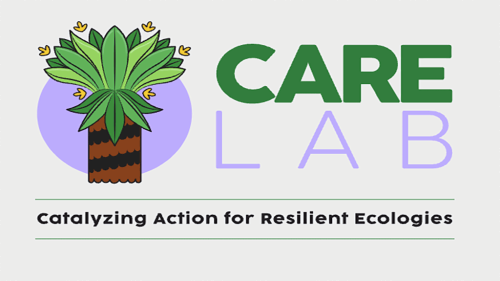
Catalyzing Action for Resilient Ecologies (CARE)
PSI Faculty: Jorge Cuartas, PhD
View Dr. Cuartas's Publications
The CARE lab focuses on understanding child development and parenting within various contexts. We use science + lived experience to drive innovative, evidence-based solutions that transform developmental systems and contexts and promote equity and well-being.
At CARE, we explore diverse developmental settings, employ various methodological approaches, and embrace interdisciplinary perspectives.

CONNECT
Strengthening Connections & Opportunities for Learning in and out of Schools
PSI Faculty: Elise Cappella, Ph.D. and Pamela Morris-Perez, Ph.D.
View Dr. Cappella's Publications / View Dr. Morris-Perez's Publications
The CONNECT lab at NYU conducts research to understand and strengthen contexts for learning and mental health in low-income education settings. We study natural opportunities for academic, social, and emotional learning via productive relationships and quality interactions.
Using social network approaches, we investigate and enhance connections among children, between children and non-familial adults (educators, practitioners), and among adults who work with youth. We collaborate with school and community partners to activate internal resources to support children with and without behavioral difficulties.
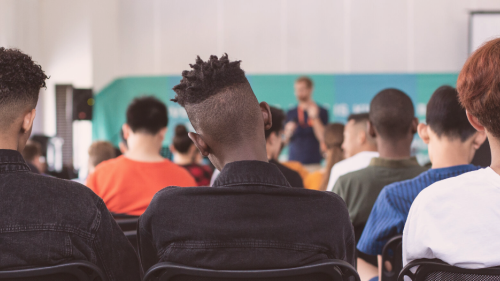
The Learning Race Lab
PSI Faculty: Diane Hughes, Ph.D.
View Dr. Hughes's Publications
We call our research lab at New York University THE LEARNING RACE LAB. It’s name reflects the fact that all of our projects focus on the variety of ways that children and adolescents in the United States come to make meaning of “racial” groups. Although race is not biologically real in any sense, we in the United States have made it real. We attach meaning to differences in physical appearance (skin color, hair texture, facial features) and assume that people who look more alike on the outside have DNA that looks more alike on the inside (which is not the case). Therefore, in all of our projects we seek to understand how children and adolescents make meaning of race based on what they observe, experience, hear, and are told in the varieties of spaces they enter (family, school, neighborhood, church, etc), combined with what their developmental competencies and tendencies are.
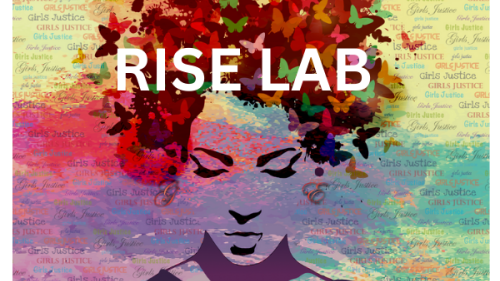
The Researching Inequity in Society Ecologically (RISE)
PSI Faculty: Erin Godfrey, Ph.D.
View Dr. Godfrey's Publications
The RISE team’s research and activities serve traditionally marginalized populations, focusing on health and mental health disparities in women and youth who are involved or at risk of involvement with the justice system. As such, the RISE Team takes a contextual, multi-level and interdisciplinary approach to systems change and implementing evidence-based practices promoting health and well-being, working closely with community partners to bridge the gap between research and practice.
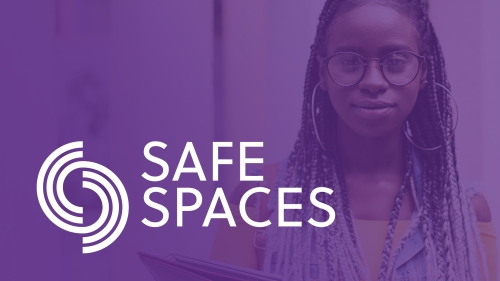
SAFE Spaces: Systems Aligning For Equity
PSI Faculty: Erin Godfrey, Ph.D.
View Dr. Godfrey's Publications
Developed in partnership with the NYC Administration for Children’s Services (ACS), SAFE Spaces uses evidence-based principles to provide training and coaching support for frontline staff working in ACS Close to Home (CTH) non-secure and limited-secure placement facilities.
Through unique skills-based staff training activities and guidance from a trained coach, SAFE Spaces aims to increase the professional development, job satisfaction, retention, and well-being in CTH staff who work directly with youth. By focusing on these staff outcomes and the environment in which they work, we also help to promote and encourage a healthier environment for youth’s lives and promote their safety, well-being and positive development. The efficacy of SAFE Spaces is being assessed through a cluster-randomized control trial supported by the National Institutes of Mental Health (NIMH).
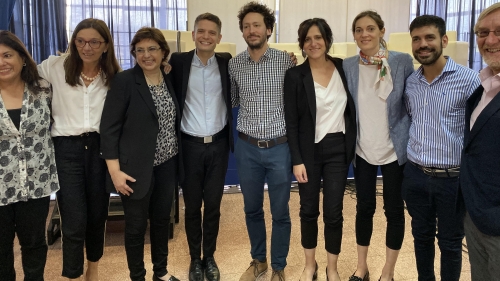
Schools for All (SfA) Lab
PSI Faculty: Alejandro Ganimian
View Dr. Ganimian's Publications
The Schools for All (SfA) lab seeks to help low- and middle-income countries transition from providing schooling to learning for all. In recent decades, these countries rapidly expanded school enrollments. These expansions increased not only the number of students per school, but also the extent to which students vary in their preparation. The lab produces rigorous evidence on three approaches that are crucial to improving learning for this rapidly growing and diverse student population: (a) preparing children and youths for each education level; (b) supporting teachers in large classes that vary widely in their achievement; and (c) encouraging principals to allocate resources to students who need them most. It does so through randomized evaluations of education interventions in close partnership with governments and non-profits, primarily in South Asia and Latin America.

SMART Beginnings
PSI Faculty: Dr. Pamela Morris-Perez
View Dr. Morris-Perez's Publications
The SMART Beginnings project tests a comprehensive approach to the promotion of school readiness in low-income families, beginning shortly after the birth of the child, through enhancement of positive parenting practices (and when present, reduction of psychosocial stressors) within the pediatric primary care platform. We do so by integrating two evidence-based interventions: 1) a universal primary prevention strategy (Video Interaction Project [VIP]); and 2) a targeted secondary/tertiary prevention strategy (Family Check-up [FCU]) for families identified as having additional risks. Drs. Pamela Morris-Perez (NYU), Alan Mendelsohn (NYU School of Medicine), and Daniel Shaw (University of Pittsburgh) have received support and funding for this project from the National Institutes of Health.

Strengthening the Architecture for High Quality Universal Pre-K (NYU UPK)
PSI Faculty: Pamela Morris-Perez, Ph.D. and Elise Cappella, Ph.D.
View Dr. Cappella's Publications / View Dr. Morris-Perez's Publications
Since 2014, senior leaders in education research and practice at both New York University and the NYC Department of Education Division of Early Childhood Education (DOE-DECE) have fostered a research-practice partnership to support roll out of universal pre-kindergarten through Pre-K For All improving the quality of its programming. The purpose of this partnership is to provide quantitative and capacity-building solutions to educational problems faced by the DOE-DECE.


